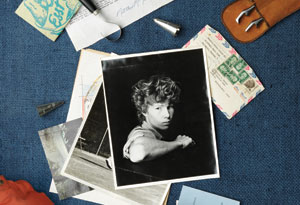On Grief: A Widow Finally Confronts The Boxes Her Husband Left Behind

Photo: Justin Fantl
Her husband was a writer, an artist, and an avid collector. Eight years after his unexpected death, she discovers the comforts and perils of going through all that he left behind.
I grew up in Amherst, Massachusetts, and fell in love for the first time at age 13, with Matt Lyon, who was 14. Our first kiss took place that summer in the cornfield that separated our houses. And when fall arrived, we met, undeterred by the cold, in the field nearly every night. With his own money, Matt bought a down jacket that was a deep orange. He was very proud of that jacket. And it kept both of us warm.We went our separate ways after high school, but, convinced we were always meant to be together, Matt came back into my life in 1992. I moved to Austin, where he was living. We had a daughter and named her Zoë, after a high school classmate, and moved to Northern California, where I worked as a reporter and Matt landed a job as head of public affairs at the University of California, Berkeley.
Like any marriage, ours had its ups and downs, but I remember once being so happy that I stole a line from the Nora Ephron film Heartburn. Meryl Streep plays a woman whose husband's infidelity ruins their marriage. "I love our life. I love how it just goes along," she says to Jack Nicholson, who plays the philanderer in question. She's clueless that the other shoe is about to drop.
A week or so after I said those same words, on February 16, 2002, Matt died of a massive heart attack. He was 45. He left behind not just me and Zoë, who was then 8, but a deep, full life. And physical evidence of that life was all over our house, his office at work, his computer.
Matt wasn't neutral about stuff. In fact, he was an assiduous collector of stuff of all kinds—a rusted pulley wheel, part of an old lathe, an antique glass car-battery case. And at first sorting through it all was easy, even healing. Giving one of his brothers the beautiful suits Matt owned seemed exactly the right thing to do.
He was also a passionate artist and craftsman. I gave Matt's boss the elegant, sturdy desk Matt had built for himself. And I donated a piece of his art to Berkeley's public affairs office, where it now hangs.
But there were things I couldn't, and wouldn't, part with. The no-brainers were the books from his childhood with inscriptions from his parents. As for his hundreds of other books, I had a rule: If it had underlining or notes in the margins in Matt's neat, precise hand, I kept it. Personal correspondence stayed, and so did his writings. Ditto the dozens of scraps of paper covered with his doodles, name badges for events he attended, old birthday cards, and intriguing little knickknacks he kept on his desk—a box shaped like a pair of ruby lips, a piece of a cornice from an old building. The down jacket, now tattered, hangs in my closet next to my own clothes. Very occasionally, I bury my nose in it.
Through eight years and four moves, I have carried around some two dozen boxes filled with these tangible memories. But last September, during a particularly brutal move that entailed condensing two households into one, I began to realize that Matt's boxes were beginning to feel like a burden.
So I decided to sort through it all, box by box. The goal, I decided, was to end up with a smaller collection of more selectively curated things for Zoë to have as an adult.
I probably wouldn't have done any of this had it not been for Cheryl Hughes. Cheryl is a professional downsizer and organizer who had helped my mother plow through 40 years of accumulation as she readied her house in San Diego for sale. Cheryl lives in San Diego, too, but came up to San Francisco to help me unpack from the latest move. My mother had found Cheryl invaluable and offered to pay for her time and airfare. It turned out to be one of the best gifts I have ever received.
Cheryl is kind and gentle but also extremely tough. She knows that sorting through tangible memories can be more difficult than grappling with the intangible ones. One can always shape and reshape memories in one's head. But objects, in their very concreteness, tell a more relentlessly truthful story.
Unpacking the boxes



